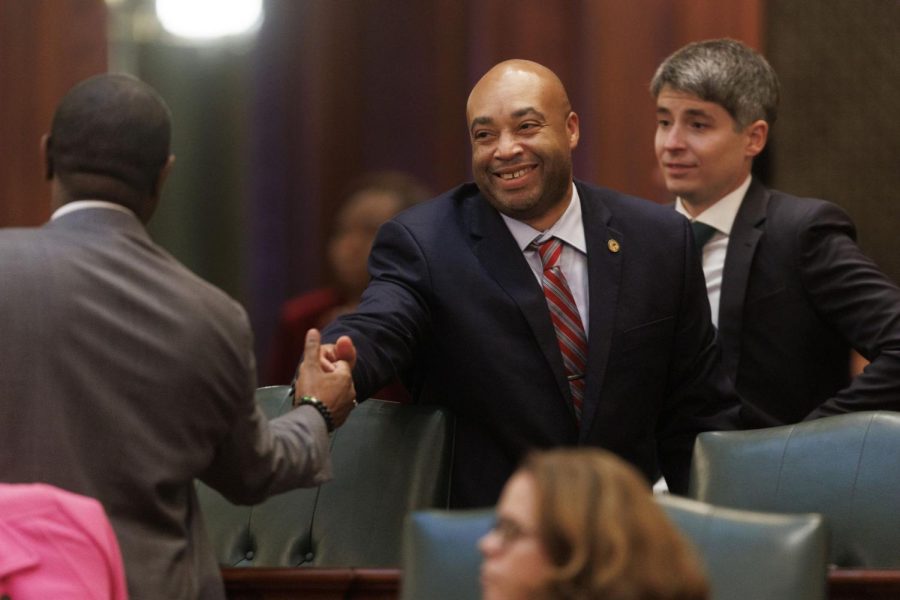Controversial SAFE-T Act now in effect, portion ruled unconstitutional
Ending cash bail was deemed unconstitutional, but several criminal justice reforms are taking place
Armando L. Sanchez / Chicago Tribune / TNS
State Rep. Justin Slaughter celebrates after the chamber passed changes to the controversial criminal justice law known as the SAFE-T Act at the Illinois Capitol building on Dec. 1.
January 19, 2023
On Feb. 22, 2021, Governor J.B. Pritzker signed the SAFE-T Act into law at Chicago State University. Parts went into effect on Jan. 1, and many have questioned the clarity and adequacy of this law.
This Act covers different areas of criminal justice reform like policing, pretrial and correction facilities. Police officers will be held more accountable for misconduct, citizens on electronic monitoring will be able to do other tasks and eligible offenders will not have to pay a monetary bail while they await their trial.
Certain aspects of the SAFE-T Act have been misconstrued to create a narrative that even citizens who pose a threat to their community can qualify for no cash bail.
Although Governor Pritzker has since revised this bill, including more clarifying language without nuance, figures on the other end of the aisle are upset with its passing.
“I believe today culminates, in my opinion, the most frustrating and disgusting, embarrassing day in Illinois’ history,” expressed the Republican State Senator Darren Bailey. “It’s a slap in the face to every voter.”
Although there are certain controversial aspects to this Act, there was a lot of information that never made it to the spotlight during the uproar. The SAFE-T Act allows for more support for pregnant prisoners, the expansion of training for officers, as well as banning chokeholds and other dangerous forces while requiring police to provide aid after using force.
“The hypocrisy of my friends on the other side of the aisle is, if you want to talk about disgusting, let’s talk about the way you will not participate in the process but then demean the same,” Democratic Senator Elgie Sims said.
On Dec. 28, soon before the SAFE-T Act was to go into effect, a Kankakee County Supreme Court judge ruled the elimination of cash bail unconstitutional. Among the claims for this ruling, Judge Cunnington claims that cash bail violated Article 1, Section 9 of Illinois’ Constitution — codifying cash bail in the state.
Other aspects of this Act were allowed to pass however, such as body camera footage being required to stay on and other provisions to police training.
“Lawmakers have worked on this Act since 2021 and have tried to modify it to help better suit all sides,” John Lunkenheimer, one of MCHS’ Youth and Law teachers at the Upper Campus, mentions. “Will everyone agree with it? No. We will see what happens.”
Since the SAFE-T act had gained traction through campaigning and social media, there has been a strong divide of whether this is the right step to take for Illinois. Justices have said that oral arguments about its appeal will be held during March. For now, the Pretrial Fairness Act portion will stay halted.






















